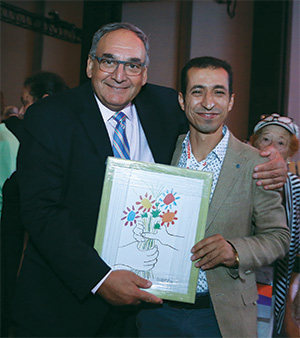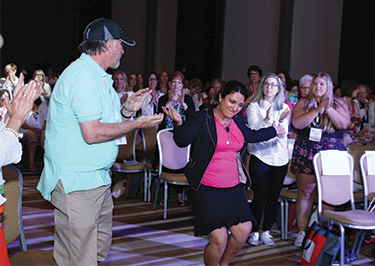Hadassah
Feature
Healing and Excelling at the ‘New Hadassah’

Last October, Richard Lakin, a 76-year-old American-born oleh, was returning home from a routine doctor’s visit in Jerusalem when two Palestinians boarded his bus and began stabbing and shooting passengers. Lakin, a retired educator and peace activist during the civil rights movement, was shot in the head and stabbed multiple times. Lakin was taken to Hadassah Hospital in Ein Kerem, where senior vascular and transplant surgeon Dr. Abed Khalaileh and his team immediately performed surgery. When she heard the news, the victim’s ex-wife, Karen Lakin, hurried to the hospital to be by his side.
Dr. Khalaileh, a Palestinian Israeli, was there for the Lakin family during the two weeks Richard Lakin lingered at the hospital before succumbing to his extensive injuries.
The day Lakin arrived at the hospital with a knife stuck in his stomach “was a black day. I can’t even find the words to describe that day,” Dr. Khalaileh said at a panel discussion at Hadassah’s national convention, where he appeared with Karen Lakin. The panel was part of the plenary session “Against All Odds, Hadassah Medical Organization (HMO),” which opened with the first major address to Hadassah by Dr. Zeev Rotstein, the new director general of HMO.
After Richard Lakin’s death, Dr. Khalaileh said he felt so close to the family that he wanted to pay a shivah call. “The situation in Jerusalem was tense,” he said. “But I decided to go.” It was a gesture that the family deeply appreciated, said Karen Lakin, a fifth-generation Hadassah life member.
For Hadassah delegates, the story “enriched our understanding of Hadassah as a bridge to peace,” said Dr. Rachel Schonberger, national chair of HMO and moderator of the session.
Conventiongoers also heard an emotional testimonial from Liana Alvarez, who experienced HMO’s emergency care firsthand. Not expected to live after a freak bus accident in Jerusalem, she bounced up to the stage in Atlanta to tell the story of how Hadassah saved her life.
Born in Azerbaijan in the former Soviet Union to a secular Jewish family, Alvarez came to the United States at age 18. During a Jewish Women’s Renaissance Project trip to Israel in the spring of 2015, she was walking up a steep road when a bus came careening backward down the road. There was no way to dodge it. She ended up pinned under a wheel until the fire department jacked up the bus to free her.

Alvarez described the “brilliant team” at Hadassah that put her back together like a jigsaw puzzle. At the age of 36, she required many surgeries and extensive rehabilitation. “Without them I wouldn’t be standing,” she said. “I wouldn’t be walking, and I wouldn’t be entering a marathon in October!”
In his address, Dr. Rotstein praised his staff—and Hadassah members, thanking them for their devotion and caring for Israel and the Jewish people.
“I’m here to testify that Hadassah is excellent in quality,” he stated, citing cutting-edge research in such fields as stem cell therapy, complex surgeries, intrauterine procedures, organ transplants, orthopedic surgery and ophthalmology. Dr. Rotstein noted that in the past year HMO’s trauma center treated the majority of the hundreds of victims injured in terror attacks in the country.
He boasted that Hadassah Hospital was recently named the top medical center in the country in quality assurance by Israel’s Ministry of Health. Acknowledging HMO’s difficult economic situation, Dr. Rotstein described his vision for the “new Hadassah”: make the medical center economically independent by 2020. HMO should be able to fund its own expenses from its own income, he said, noting that Hadassah, the Women’s Zionist Organization of America, would continue to play a pivotal role in funding new research, technology and building.
Dr. Rotstein also touted Hadassah’s burgeoning cooperative programs with Russia and China. “I find myself dreaming big dreams and crossing oceans and big seas, being involved in the development of future health systems of other countries,” he said.
After Dr. Rotstein’s opening address, a number of speakers expanded on both achievements and future developments at HMO. Past Hadassah National President Bonnie Lipton was the focus of a tribute for her leadership role as building chair for the state-of-the-art Sarah Wetsman Davidson Hospital Tower. Delegates enjoyed her humorous singing video as she led a virtual tour of the new wing—and they were reminded of the need to raise $24 million more to complete the tower. The tower features ultramodern underground operating rooms complete with safeguards to handle and withstand biological or chemical attacks.
In other HMO-related developments, Michele Rubin, chair of the newly launched Research in Service to Humanity Campaign, said that in 2017 Hadassah will focus on heart disease, multiple sclerosis, melanoma and breast cancer, and has designed programs to help members educate, advocate and fund-raise in their communities to support research at the hospital.
In addition, the Hebrew University–Hadassah Medical School has approved a new doctoral program in nursing, announced Dianne Gottlieb, a certified nurse midwife and Hadassah national vice president. The medical school also will enroll two groups of Ethiopian students as part of a new nursing track. They will receive financial assistance for tuition, housing and supplies, she said.
Later that day, at the convention’s Founders Dinner, Dr. Benjamin Reubinoff, in a question-and-answer session with Diane Issenberg, development division coordinator, focused on the pioneering stem cell program at HMO. Dr. Reubinoff, director of Hadassah’s Human Embryonic Stem Cell Research Center, recounted how, 16 years ago, he smuggled embryonic stem cells from Australia in his shirt pocket, hoping the authorities wouldn’t stop him since it was illegal at the time to conduct research on human embryonic stem cells. With his “Israeli chutzpah,” he said, “I saw the vision and I saw the potential” for the therapeutic use of stem cells.
With the support of HWZOA, he said, he helped establish the research center with the unique goal of taking the field from the early stages of derivation of the stem cells to their actual use in patients. The dual approach, he explained, is to enable other centers, with Hadassah’s published research, to develop similar abilities as well as to provide Hadassah-derived stem cells for use worldwide in the development of “novel therapies” for macular degeneration, diabetes and neurological conditions such as amyotrophic lateral sclerosis (ALS) and multiple sclerosis.
The hospital is currently involved with clinical trials to inject stem cells into the eyes of patients with macular degeneration with the goal of helping them dramatically improve their sight.
One beneficiary of stem cell infusions by Hadassah neurologist Dr. Dimitrios Karussis came to the convention to share her story. Malia Litman, a former nurse and trial lawyer from Dallas who was struck by multiple sclerosis in 1999, found HMO as she searched around the world for any possible hope. Having progressed from a wheelchair to a walker as a result of her treatment, Litman, who received her first stem cell infusion in 2015, rose to tell her story and poignantly thanked her “Hadassah family” for its enormous support and encouragement.










 Facebook
Facebook Instagram
Instagram Twitter
Twitter
Leave a Reply